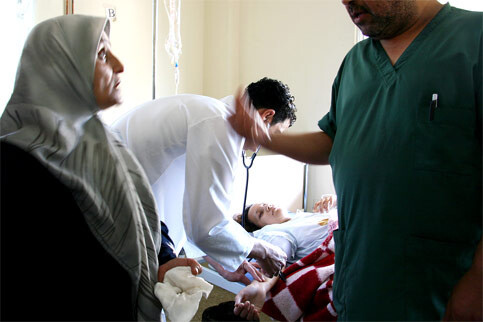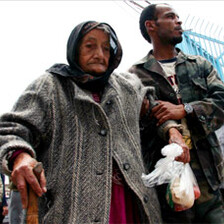Electronic Lebanon 22 May 2007

As her mother and doctor stand by, 18-year-old Manal Tohan lies in hospital after being struck by shrapnel when her home in Nahr al-Bared was hit by artillery fire. (Hugh Macleod/IRIN)
BEIRUT, 22 May 2007 (IRIN) - A shaky ceasefire has failed to alleviate the worsening humanitarian crisis inside Nahr al-Bared Palestinian refugee camp in north Lebanon, where over 40,000 civilians remained trapped as fighting between the Lebanese army and Islamic militants entered its third day.
Though the army appeared to have eased its artillery and tank bombardment of positions suspected to be held by radical Sunni fighters from Fatah al-Islam, key relief organisations remained unable to access the camp to deliver aid to those in need.
Mona Samra, information officer for the United Nations Relief and Works Agency (UNRWA), told IRIN the agency had sent a truck loaded with food supplies — including 6,000 packets of bread and six tonnes of milk, water and chronic disease medication — but that access to Nahr al-Bared had initially been impossible.
Late on Tuesday afternoon, the UNRWA office in Beirut said its aid truck had been able to enter the camp but had come under fire from an unknown source and was forced to leave. There was no initial word of casualties. On its second attempt, the agency was successful in entering and delivering emergency supplies to the camp.
Fatah al-Islam declared a unilateral ceasefire at 2.30 pm Beirut time but it was broken after only a few minutes, as gunshots rang out across the camp. Residents are said to have moved away from the edge of the camp, where fighting between militants and the army has been heaviest. NGOs report that up to 50 people are sheltering in tiny underground bunkers while families are huddled together 20 to a room in the centre of the camp.
At least 80 killed
At least 80 people have been killed in the clashes so far, including 30 Lebanese soldiers and 20 militants, according to the Lebanese army and Palestinian sources.
Seventeen Palestinian civilians have also been killed, according to Sultan Abu Aynen, the Fatah leader in Lebanon.
“They are in a very difficult humanitarian situation, which is seriously deteriorating. We are getting calls all day from inside the camp pleading with us to help,” said Samra.
UNRWA’s Lebanon director Peter Cook travelled north to the camp to help coordinate relief efforts, but with UNRWA’s representative himself trapped inside Nahr al-Bared, assessing the humanitarian situation remained difficult.
The International Committee of the Red Cross (ICRC) sent a delegation to Nahr al-Bared on Monday but was only able to distribute two medical kits to representatives from the neighbouring Bedawi camp, run by Fatah’s Palestinian Popular Committees, where the dead and injured from Nahr al-Bared are being transported.
Very few can enter camp
“We are in contact with all parties but have not received a guarantee they will not open fire if we go in,” Marie Jean Eby, the ICRC protection delegate who travelled to Nahr al-Bared, told IRIN. “Assessing the humanitarian situation is also proving difficult. There is very little information coming out and very few people can enter the camp.”
Dr Yousef Assad of the Palestinian Red Crescent in Bedawi, which is the only emergency relief service currently accessing the camp, said his ambulances had made three trips into the camp on Tuesday but had only been able to evacuate three injured civilians.
One of the ambulances had suffered punctured tyres from shrapnel in the streets, while accessing large areas of the camp by road was complicated by piles of rubble blocking the way. Assad said he believed at least 100 injured civilians are currently in need of evacuation, but said his hospital was fast running out of spare beds.
George Kitani, head of the Lebanese Red Cross, told IRIN his ambulances were ferrying injured from the edge of the camp to nearby hospitals but were not entering the camp themselves.
“What’s happening is a massacre,” Bilal Aslan, a commander in Fatah, the largest Palestinian faction inside Nahr al-Bared and a secular rival to Fatah al-Islam, told IRIN from the camp.
“The situation is tragic and can’t continue like this. We have lots of wounded people who we cannot take to hospitals. Two wounded men in their thirties bled to death today because they were trapped inside the camp. The big crisis is water. If we do not manage to get water into the camp, the situation will be a disaster for the civilians.”
Aslan said that though the Lebanese army had made some progress he did not believe Fatah al-Islam were on the brink of defeat, saying they had sleeper cells outside the camp they have not yet activated.
He said Fatah had orders to fire on Fatah al-Islam only when attacked, but warned that continued civilian deaths could lead to an uprising by Palestinians in other camps.
“We hope this fight will not be so expensive for civilians. There are demonstrations breaking out in other camps because even though they support the Lebanese army the Palestinians cannot accept seeing their brothers slaughtered.”
The ICRC issued a statement late on Tuesday calling on all fighting parties to abide by international human rights laws.
This item comes to you via IRIN, a UN humanitarian news and information service, but may not necessarily reflect the views of the United Nations or its agencies. All IRIN material may be reposted or reprinted free-of-charge; refer to the copyright page for conditions of use. IRIN is a project of the UN Office for the Coordination of Humanitarian Affairs.
Related Links


